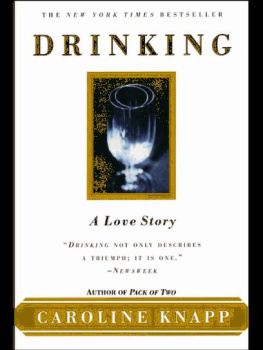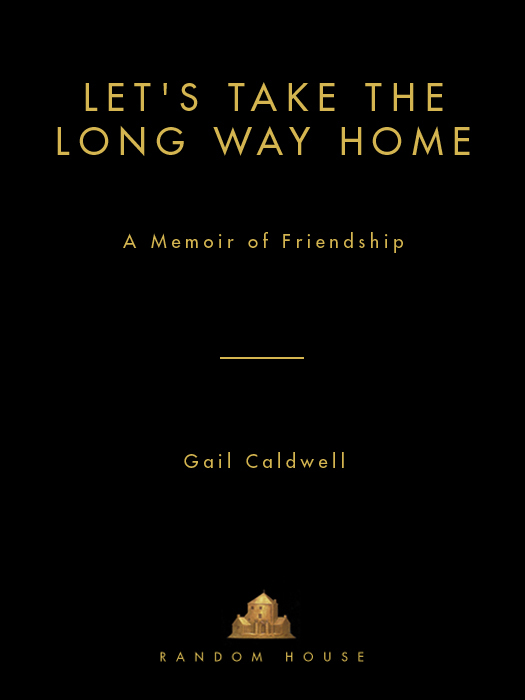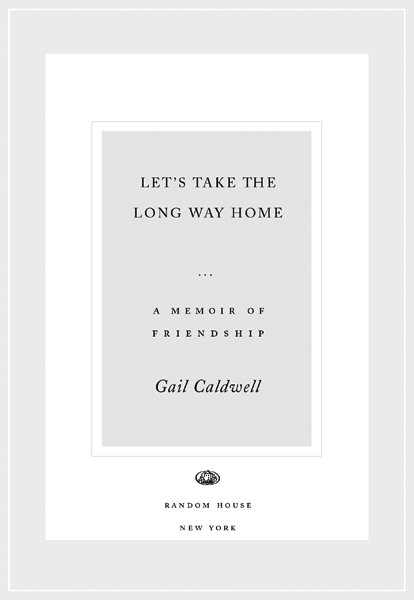ALSO BY
GAIL CALDWELL
A Strong West Wind
Contents
for Caroline
The golden moments in the stream of life rush past us, and we see nothing but sand; the angels come to visit us, and we only know them when they are gone.
GEORGE ELIOT , Scenes of Clerical Life
ITS AN OLD, OLD STORY: I HAD A FRIEND AND WE shared everything, and then she died and so we shared that, too.
The year after she was gone, when I thought I had passed through the madness of early grief, I was on the path at the Cambridge reservoir where Caroline and I had walked the dogs for years. It was a winter afternoon and the place was emptythere was a bend in the road, with no one ahead of or behind me, and I felt a desolation so great that for a moment my knees wouldnt work. What am I supposed to do here? I asked her aloud, by now accustomed to conversations with a dead best friend. Am I just supposed to keep going? My life had made so much sense alongside hers: For years we had played the easy, daily game of catch that intimate connection implies. One ball, two gloves, equal joy in the throw and the return. Now I was in the field without her: one glove, no game. Grief is what tells you who you are alone.
1.
I CAN STILL SEE HER STANDING ON THE SHORE, A towel around her neck and a post-workout cigarette in her handhalf Gidget and half splendid splinter, her rowers arms in defiant contrast to the awful pink bathing suit shed found somewhere. It was the summer of 1997, and Caroline and I had decided to swap sports: I would give her swimming lessons and she would teach me how to row. This arrangement explained why I was crouched in my closest friends needle-thin racing shell, twelve inches across at its widest span, looking less like a rower than a drunken spider. We were on New Hampshires Chocorua Lake, a pristine mile-long body of water near the White Mountains, and the only other person there to watch my exploits was our friend Tom, who was with us on vacation.
Excellent! Caroline called out to me every time I made the slightest maneuver, however feeble; I was clinging to the oars with a white-knuckled grip. At thirty-seven, Caroline had been rowing for more than a decade; I was nearly nine years older, a lifelong swimmer, and figured I still had the physical wherewithal to grasp the basics of a scull upon the water. But as much as I longed to imitate Caroline, whose stroke had the precision of a metronome, I hadnt realized that merely sitting in the boat would feel as unstable as balancing on a floating leaf. How had I let her talk me into this?
Novice scullers usually learn in a boat twice the width and weight of Carolines Van Dusen; later, she confessed that she couldnt wait to see me flip. But poised there on waters edge, hollering instructions, she was all good cheer and steely enthusiasm. And she might as well have been timing my success, fleeting as it was, with a stopwatch. The oars my only leverage, I started listing toward the water and then froze at a precarious sixty-degree angle, held there more by paralysis than by any sense of balance. Tom was belly-laughing from the dock; the farther I tipped, the harder he laughed.
Im going in! I cried.
No, youre not, said Caroline, her face as deadpan as a coachs in a losing season. No, youre not. Keep your hands together. Stay stilldont look at the water, look at your hands. Now look at me. The voice consoled and instructed long enough for me to straighten into position, and I managed five or six strokes across flat water before I went flying out of the boat and into the lake. By the time I came up, a few seconds later and ten yards out, Caroline was laughing, and I had been given a glimpse of the rapture.
THE THREE OF US had gone to Chocorua for the month of August after Tom had placed an ad for a summer rental: Three writers with dogs seek house near water and hiking trails. The result of his search was a ramshackle nineteenth-century farmhouse that we would return to for years. Surrounded by rolling meadows, the place had everything we could have wanted: cavernous rooms with old quilts and spinning wheels, a camp kitchen and massive stone fireplace, tall windows that looked out on the White Mountains. The lake was a few hundred yards away. Mornings and some evenings, Caroline and I would leave behind the dogs, watching from the front windows, and walk down to the water, where she rowed the length of the lake and I swam its perimeter. I was the otter and she was the dragonfly, and Id stop every so often to watch her flight, back and forth for six certain miles. Sometimes she pulled over into the marshes so that she could scrutinize my flip turns in the water. We had been friends for a couple of years by then, and we had the competitive spirit that belongs to sisters, or adolescent girlseach of us wanted whatever prowess the other possessed.
The golden hues of the place and the easy days it offeredriver walks and wildflowers and rhubarb piewere far loftier than what Caroline had anticipated: She considered most vacations forced marches out of town. I was only slightly more adventurous, wishing I could parachute into summer trips without having to fret about the dog or shop for forty pounds of produce. Both writers who lived alone, Caroline and I shared a general intractability at disrupting our routines: the daily walks in Cambridge, Massachusetts, the exercise regimens we shared or compared, the meals and phone calls and hours of solitary work that we referred to as our little lives. Paris is overrated, Caroline liked to claim, partly to make me laugh; when she met a friend of mine one evening who was familiar with her books, he asked if she spent a lot of time in New York. Are you kidding? she said. I hardly even get to Somerville. Wedded to the sanctity of the familiar, we made ourselves leave town just to check the vacation off the list, then return to the joys and terrors of ordinary life.
I HAVE A PHOTOGRAPH from one of those summers at Chocorua, framing the backs of my dog and Carolines, Clementine and Lucille, who are silhouetted in the window seat and looking outside. It is the classic dog photo, capturing vigilance and loyalty: two tails resting side by side, two animals glued to their post. What I didnt realize for years is that in the middle distance of the picture, through the window and out to the fields beyond, you can make out the smallest of figuresan outline of Caroline and me walking down the hill. We must have been on our way to the lake, and the dogs, by now familiar with our routine, had assumed their positions. Carolines boyfriend, Morelli, a photographer, had seen the beauty of the shot and grabbed his camera.
I discovered this image the year after she died, and it has always seemed like a clue in a paintinga secret garden revealed only after it is gone. Chocorua itself has taken on an idyllic glow: I remember the night Caroline nearly beat Tom at arm wrestling; the mouse that sent me onto the dining room table while she howled with laughter; the Best Camper awards we instituted (and that she always won). I have glossed over the mosquitoes, the day Caroline got angry when I left her in a slower-moving kayak and rowed off into the fog alone. Like most memories tinged with the final chapter, mine carry a physical weight of sadness. What they never tell you about grief is that missing someone is the simple part.
THE TWO OF US ROWED , together and in tandem, for five years after that first summer. We both lived near the Charles River, a labyrinthine body of water that winds its way through Greater Boston for nine miles, from upper Newton through Cambridge and into Boston Harbor, with enough curves and consistently flat water to be a mecca for rowers. Because Caroline was small in stature and could body-press more than her own weight, I got to calling her Brutita, or little brute. The boathouses we rowed out of were a couple of miles apart, and I could recognize Carolines stroke from a hundred yards awayId be there waiting for her near the Eliot Bridge or the Weeks Footbridge by Harvard, ready to ply her with questions about form and speed and where to position ones thumbs. When she went out hours ahead of me, she fired off unpunctuated e-mails as soon as she got home: hurry up the water is flat. We logged hundreds of miles, together and solo, from April to November; she endured my calls, in those first couple of summers, to discuss the mechanics of rowing: I want to talk about thrust, I would say, with insane intensity, or, Did you know the human head weighs


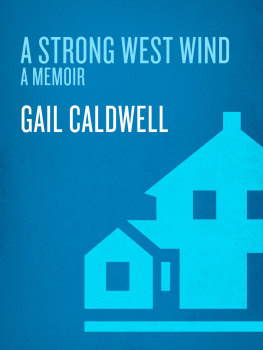
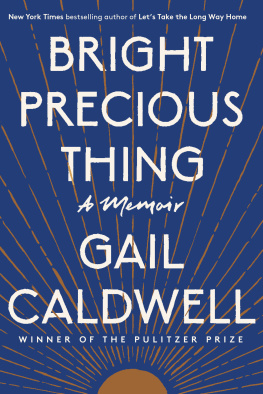
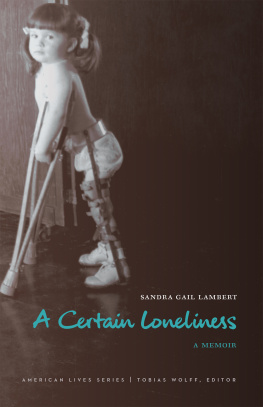

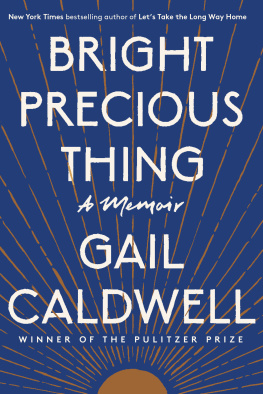
![Chloe Caldwell [Chloe Caldwell] - Women](/uploads/posts/book/114454/thumbs/chloe-caldwell-chloe-caldwell-women.jpg)
